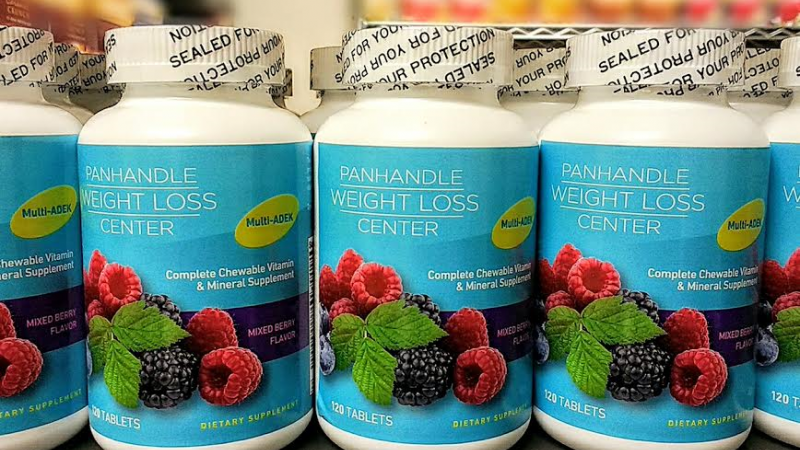The Value in Vitamins
Does the thought of a ‘meal’ worth of vitamins multiple times throughout the day sound complicated and not really worth it? (I agree.) When beginning the journey towards bariatric surgery, getting used to the idea of your stomach being 80% smaller is…different. Then learning your new stomach has to hold an abundance of protein, water, daily medications, and now vitamins?! Yikes.
One of the most common myths I feel associated with bariatric surgery is that a patient will have to be able to afford and tolerate a large amount of vitamins and minerals or else all of your hair will fall out. Well ladies and gentlemen; I am here to inform you that is simply not true!

It is important to be knowledgeable in what the American Society of Metabolic and Bariatric Surgery (ASMBS) recommends you supplement every day with eating a balanced diet. This is to ensure you are receiving all essential and nonessential vitamins and trace minerals. Why is this so important?
Let me put a common concept into perspective. B-vitamins. Those are popular, right? But what are they and why do we take them?
B12, for example is the most commonly known B-vitamin amongst the general population. That being said, it is only ONE of the EIGHT B-vitamins there are. B-1, the short name for thiamin, is a B-vitamin that is particularly important after bariatric surgery. Thiamin is needed for our brain to function and it helps our body break down and use carbohydrates, proteins, and fats. We store thiamin in the liver, but only in small amounts. The life span of thiamin is very short; therefore it is very important to receive continuous amounts through the diet (pork, beef, poultry, organ meats, enriched whole grains, legumes, bran, and nuts), foods in which you will be consuming very little of after bariatric surgery and/or not consuming at all. Three examples of how thiamin can easily be depleted: 1) bypassing the area where thiamin is absorbed (those who have undergone duodenal switch), 2) not consuming the recommended daily amount, or 3) the body is requiring more in order to metabolize an increased amount of carbohydrates or protein (sound familiar after bariatric surgery?). Becoming depleted in thiamin can cause nausea, vomiting, and abdominal pain (sound familiar to some in extreme cases after bariatric surgery?). This is just one of many examples to understanding WHY we need to use supplements after having bariatric surgery.
Remember, aside from supplementing with the recommended bariatric daily values, taking any additional vitamins, minerals, or herbal supplements should be consulted with your physician and/or registered dietitian. Due to evolving science, there are a FEW multivitamin-multimineral supplements that meet ASMBS standards without needing to consume a bowl of supplements every day. That being said, you will not be able to find an over-the-counter multivitamin-multimineral at Wal-Mart, CVS, SAMS (for example) that will meet your needs as a bariatric patient because the general population does not need the increased dosages of vitamins and mineral every day.
Therefore, I am pleased to announce that Panhandle Weight Loss Center is the only place in Amarillo that carries a complete bariatric multivitamin-multimineral! This multivitamin-multimineral supplies most patients with their ASMBS recommended daily values within 2 servings (breakfast and dinner) for the whole day! Those who have a past history of vitamin deficiencies (anemia, low vitamin D, low B12) or patients having the duodenal switch will be required to add onto this multivitamin-multimineral, but nevertheless chewing tasty vitamins/minerals 2-3 times a day is much better than traditional regimens that require supplements 5-8 times per day.
Remember the goal of supplements are to help SUPPLEMENT what you may or may not be receiving from your diet, or absorbing in your digestive system.
Here at Panhandle Weight Loss Center, we strongly recommend that you ask your registered dietitian about your vitamin and mineral regime to ensure you are receiving what you need. You can also use this chart as a checklist to make sure you are meeting your needs based on the American Society of Metabolic and Bariatric Surgery’s newly updated 2016-2017 nutritional guidelines.
| Sleeve Gastrectomy | Loop Duodenal Switch | |
| Vitamin A | 5,000-10,000 IU | 10,000IU |
| Vitamin C | 120mg | 120mg |
| Vitamin D3 | 3,000 IU | 3,000-6,000IU |
| Vitamin E | 15mg | 15mg |
| Vitamin K | 90-120mg | 300mg |
| Thiamin | 12mg | 12mg + 50mg from B-Complex (begin with 1 per day, then increase to 2 if needed) |
| Riboflavin | 3.4mg | 3.4mg |
| Niacin | 40mg | 40mg |
| B6 | 4mg | 4mg |
| Folic Acid | 400mcgWomen of childbearing age: 800-1,000mcg/day | 400-800mcgWomen of childbearing age:800-1,000mcg/day |
| B12 | 350-500 mcg/day | 350-500 mcg/day(levels <400 add 1,000mcg/day sublingual) |
| Biotin | 60mcg | 60mcg |
| Pantothenic Acid | 20mg | 20mg |
| Calcium*(Calcium carbonate take with meals)*(Calcium citrate can be taken with or without meals) | 1,200-1,500mg | 1,800-2,400mg(Recommend starting with 1,800mg/day and increase only if directed by physician or dietitian) |
| Iron | 45mgWomen menstruating:50-100mg | 45-60mgWomen menstruating:50-100mg |
| Magnesium | 400mg | 400mg |
| Zinc | 8-11mg | 15-30 mg |
| Copper | 1mg | 2mg |
| Manganese | 3.6mg | 3.6mg |
| Chromium | 120mcg | 120mcg |
| Molybdenum | 90mcg | 90mcg |
Parrott J, Frank L, Dilks R, et al. American society for metabolic and bariatric surgery integrated health nutritional guidelines for the surgical weight loss patient 2016 update: micronutrients (2017) http://dx.doi.org/10.1016/j.soard.2016.12.018
Mechanick JI, Youdim A, Jones DB, et al. Clinical practice guidelines for the perioperative nutritional, metabolic, and nonsurgical support of the bariatric surgery patient 2013 update. Cosponsored by American Association of Clinical Endocrinologists, the Obesity Society, and the American Society for Metabolic and Bariatric Surgery, Surg Obes Relat Dis 2013;9(2):159-91